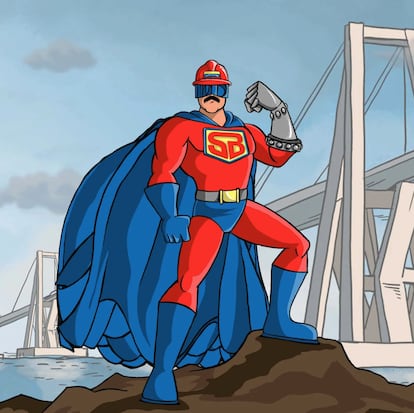Superheroes with an iron fist
President Nayib Bukele of El Salvador, Venezuela’s Nicolás Maduro and other populist rulers of this century sell an image of infallibility and invulnerability that is typically found in comic books

The wife enters the presidential office of the Miraflores Palace and asks her husband: “What are you doing, Nico?” And he — without ceasing to sign papers — responds, with an inspired look: “I’m approving projects for the benefit of the people.” Meanwhile, an evil Uncle Sam — in his own office — comments, with a devilish grin: “There will be no benefits for your people after what I have prepared.” He then presses a button to launch Extremist, a five-headed monster.
This will be enough for President Maduro — just like Superman does — to strip off his daily clothes and switch into his red-and-blue superhero suit (shorts and cape included) and take off in rapid flight to face the monster that seeks to sow chaos and destruction in the streets. He quickly defeats it with a few blows of his iron fist. Another task accomplished for SuperBigote (or Supermustache), in defense of the homeland and the Bolivarian revolution!
The cartoon series — which shows SuperBigote deploying superpowers to confront the imperialist enemy — is complemented with 12 million dolls of the superhero and superheroine (the first lady), many of which were distributed as Christmas gifts to children in Venezuela’s shantytowns in December 2022.
The series emerged in 2021. In its first episode, SuperBigote destroys the electromagnetic drone sent by a villain resembling Trump, which leaves the country in the dark. This comic strip replicated the reality of nationwide blackouts caused by the corruption and negligence of Maduro’s own government.
By transforming into SuperBigote, Maduro becomes muscular, shedding all his excess fat (it couldn’t be any other way, as the red suit is very tight). And the librettists of the presidential palace forget — or they simply don’t want to acknowledge — that the costumes created by the cartoonists come straight from the tradition of the circuses. Maduro’s outfits resemble what is worn by jugglers, tightrope walkers and trapeze artists under the colorful tents.
SuperBigote always defeats villains and evildoers, because he’s invincible, invulnerable and infallible. He’s tougher than Superman, because there’s no kryptonite that can weaken him.
We’re in the world of cartoons where reality is superfluous. In that world of gaudy colors, there’s no corruption, no government waste… and no multi-billion dollar fortunes being transferred by Venezuelan officials to secret bank accounts in Andorra.
It matters little whether the populist superheroes of the 21st century claim to be from the left or the right: the important thing is for their propagandists to establish their invulnerability. While there are still no cartoons of SuperBukele (the incumbent president of El Salvador), his image experts — who, by the way, are also Venezuelans (although they hail from the opposition to Maduro) — are in charge of presenting him as a supercool superpresident, who makes his entrance on stages between streams of light.
In the YouTube video of Bukele’s visit to his government’s newly-constructed mega-prison — the ultra-modern Terrorism Confinement Center — a whole super-production is put together, with drone shots and low-level shots. The prisoners — in white T-shirts and shorts — are forced to crouch down and run like strange birds, while the camera follows them closely, capturing their tattooed faces and shaved heads. We also see President Bukele — dressed in jeans and a sweater, with no formalities (he only wore a tuxedo for the Miss Universe gala) — tour the spectral facilities, a dystopian world resembling the ones described by Orwell or Atwood. The submissive prison chief gives him rehearsed answers to rehearsed questions: “Prisoners don’t come here to be re-educated, Mr. President, but to pay their debt to society. Whoever enters here never leaves again, Mr. President.”
Unlike Maduro, the young president of El Salvador — who has a neatly-trimmed beard and often wears baseball caps backwards — is undoubtedly popular. He has imposed order against the gangs through a permanent state of emergency, which suspends certain rights. With the country pacified, he has just won re-election with 85% of the vote.
And Bukele is never wrong, either. He has an accurate answer for everything: he’s capable of leaving the most intelligent person in silence. And, if they try to question him or contradict him (in staged settings), he humiliates them. He is portrayed as the most well-versed legal scholar, the most knowledgeable economist when it comes to cryptocurrency, or the most incisive journalist, all at the same time.
Social media is filled with clips planted by Bukele’s Venezuelan gurus, where he’s seen standing in front of the lectern, listening with a patient demeanor to his victim’s question. The viewer already knows that the impertinent person will soon bite the dust in defeat, given the devastating forcefulness of the answer. “The best president in the world” isn’t just cool — he’s infallible.
Politics as a comic strip. A whole epic told, frame by frame, in cartoons.
Sign up for our weekly newsletter to get more English-language news coverage from EL PAÍS USA Edition
Tu suscripción se está usando en otro dispositivo
¿Quieres añadir otro usuario a tu suscripción?
Si continúas leyendo en este dispositivo, no se podrá leer en el otro.
FlechaTu suscripción se está usando en otro dispositivo y solo puedes acceder a EL PAÍS desde un dispositivo a la vez.
Si quieres compartir tu cuenta, cambia tu suscripción a la modalidad Premium, así podrás añadir otro usuario. Cada uno accederá con su propia cuenta de email, lo que os permitirá personalizar vuestra experiencia en EL PAÍS.
¿Tienes una suscripción de empresa? Accede aquí para contratar más cuentas.
En el caso de no saber quién está usando tu cuenta, te recomendamos cambiar tu contraseña aquí.
Si decides continuar compartiendo tu cuenta, este mensaje se mostrará en tu dispositivo y en el de la otra persona que está usando tu cuenta de forma indefinida, afectando a tu experiencia de lectura. Puedes consultar aquí los términos y condiciones de la suscripción digital.









































